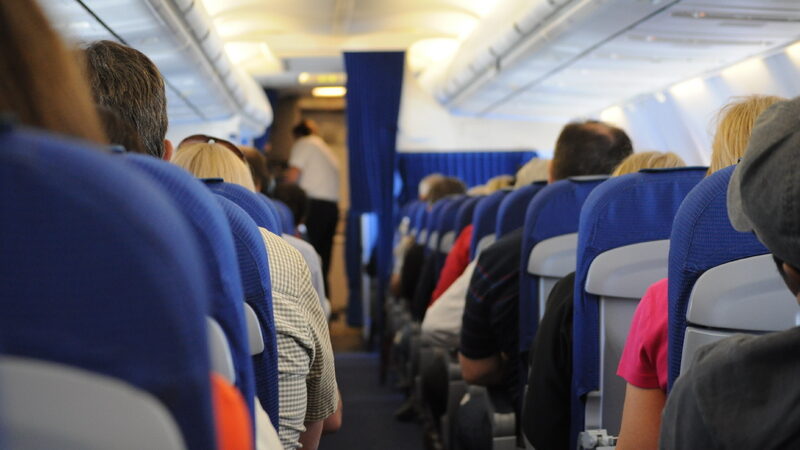As the UK recorded a record high temperature of 40.3C on Tuesday, the government published its “jet zero” strategy to tackle one of the hardest to decarbonise sectors: aviation.
The strategy launch at Farnborough International Airshow was delayed from morning to afternoon, while transport secretary Grant Shapps did a media round to explain why Britain’s roads and railways couldn’t handle the heat.
Publicity for the launch was confined to a press release, stacked with supportive quotes from the industry, and a tweet, in which Shapps declared it would “allow passengers to enjoy guilt-free flying”.
A handful of activists in pig masks greeted him with the sceptical slogan: “Jet zero? Pigs might fly!”
The “guilt” of air travel comes from its outsized carbon footprint. While aviation only accounts for 2.5% of global carbon dioxide emissions, on a personal level, air travel is a polluting luxury. One long-haul flight can erase the emissions benefits of going vegetarian for a year.
It is why a UK citizens’ assembly on climate two years ago came out strongly in favour of a frequent flyer levy and ban on private jets. That was too radical for this government. Nor would it consider limiting airport growth.
Instead, it is relying on fuel efficiency, sustainable aviation fuels and carbon offsets to decarbonise – and destigmatise – the sector. The government’s “aspiration” is to run the first zero-emission domestic routes in 2030.
Germany promotes insurance-based ‘global shield’ for climate victims
The strategy sets out interim targets to net zero aviation by 2050, with a progress review every five years. For the domestic sector, it sets a more ambitious net zero target of 2040.
“We want 2019 to be remembered as the peak year for aviation emissions. From now on, it should all be downhill for carbon emissions – and steadily uphill for green flights,” said Shapps.
It is a “more challenging trajectory” than the government has previously set out, said Cait Hewitt, policy director at the Aviation Environment Federation. But there is nothing to hold the industry to account for delivering – and its track record is not good.
Campaigning organisation Possible audited every climate target the international aviation sector had set since 2000. Out of 50, all but one had been missed, abandoned or forgotten about.
As with previous aviation climate strategies, “jet zero” relies on future technology breakthroughs rather than curbing demand – and all of the options run into problems at scale. By Hewitt’s calculation, to meet the UK’s jet fuel demand entirely with e-fuel would require a windfarm the size of Northern Ireland.
“We don’t feel that the government is being honest about the challenges,” she told Climate Home News.
Specific measures include a £165 million fund to support the development of sustainable aviation fuel (SAF) and a mandate requiring at least 10% of jet fuel to come from sustainable sources by 2030.
This can mean biofuels derived from algae or waste, or synthetic fuels made with green hydrogen and captured carbon. None of the options are yet commercially competitive to produce.
Gaynor Hartnell, of industry body the Renewable Transport Fuel Association, said SAF was “the only viable solution for long haul flight” and welcomed the support. But the five production plants the government expects to deliver supplies cost £500 million apiece, she added, and will require further subsidies to get off the ground.
For Greenpeace UK, reducing the number of flights is the only meaningful answer. “This government doesn’t have the courage to regulate aviation emissions yet and this isn’t a plan to do that, just a delaying tactic and a very expensive waste of time,” said campaigner Emily Armistead.
This article was updated after publication with the precise temperature record.
